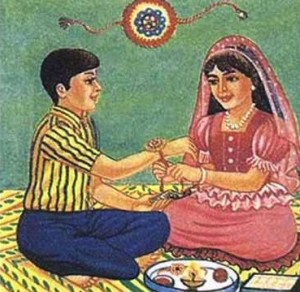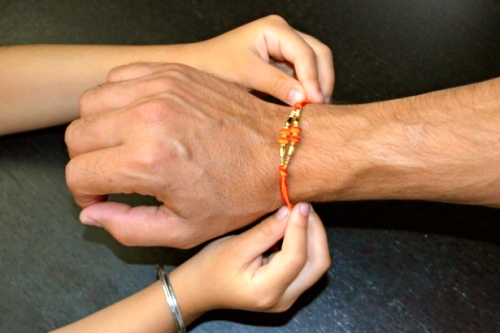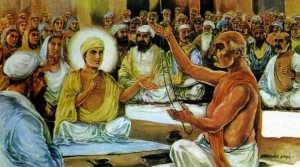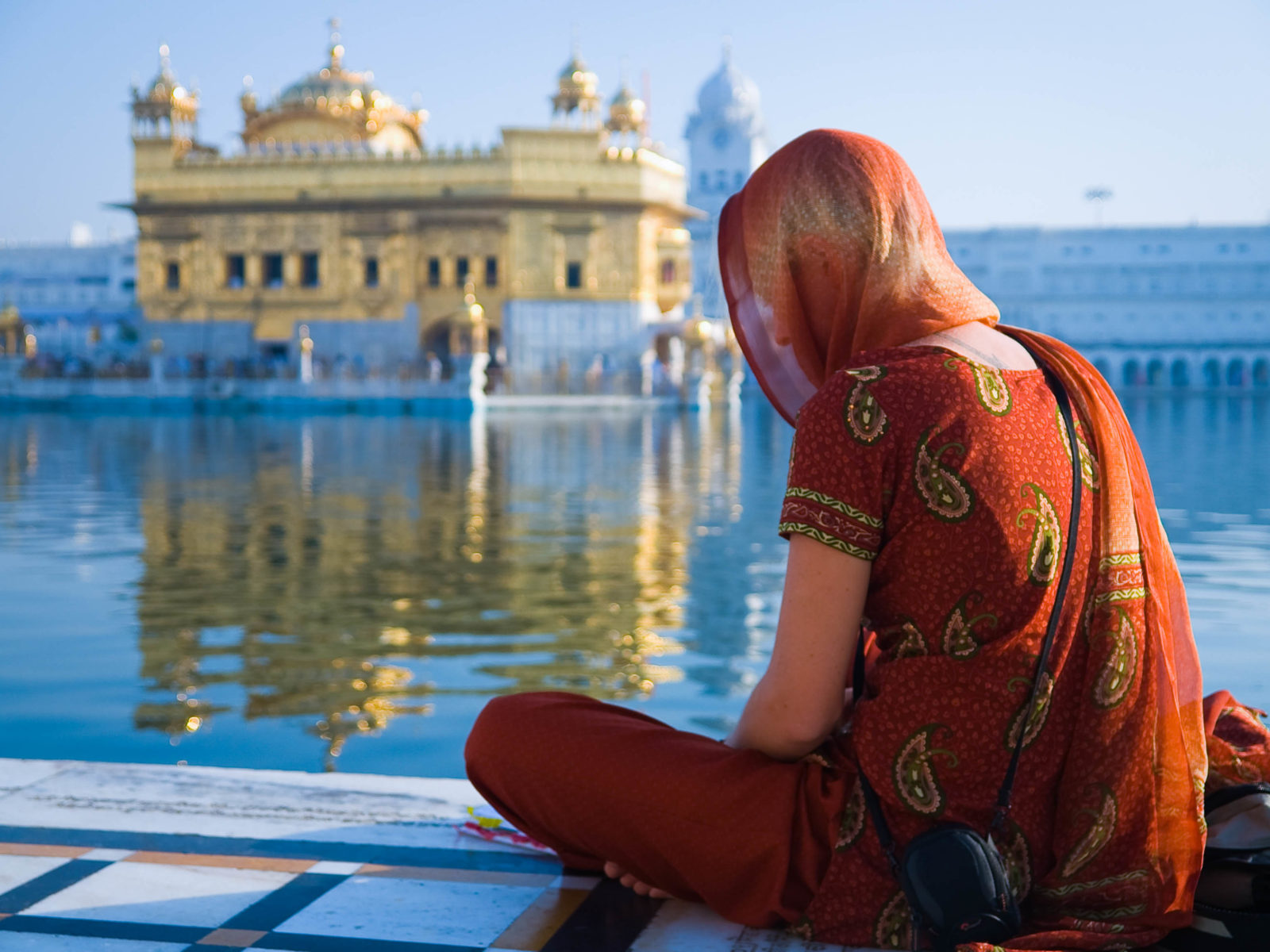by Anonymous Kaur
I think it might be Rakhri Day or something. At least, that’s what my Facebook news feed indicates.
It’s strange that my Facebook feed would illustrate that because I thought Rakhri was a Hindu celebration. But I only have one Hindu friend on Facebook. Most of my other friends on Facebook are Sikh…so why is it that all of these Sikhs are celebrating a Hindu holiday?
Maybe Sikhs don’t understand that Rakhri is a Hindu tradition and follow it blindly.
Raksha Bandhan is a Hindu festival that celebrates the duty between brothers and sisters. In Sanskrit, the word “Raksha Bandhan” literally means, “the tie or knot of protection.” It symbolizes the protection a brother is to provide for his sister. On this day, a sister will tie a rakhri (sacred thread) on her brother’s wrist. It’s supposed to symbolize her love and prayers for his well being and the brother’s lifelong vow to protect her.
I find this to be problematic for several reasons:
 1. I don’t need to be protected by a man. I’m physically stronger than my brother. Plus I’ve practiced Tae Kwon Do for years. So, I should probably be the one protecting him. Furthermore, the Gurus gave Singhs and Kaurs equality, and gave me the right to protect and defend myself. That’s why Guru Gobind Singh Ji have me a kirpan, not a rakhri.
1. I don’t need to be protected by a man. I’m physically stronger than my brother. Plus I’ve practiced Tae Kwon Do for years. So, I should probably be the one protecting him. Furthermore, the Gurus gave Singhs and Kaurs equality, and gave me the right to protect and defend myself. That’s why Guru Gobind Singh Ji have me a kirpan, not a rakhri.
2. Isn’t love two-ways? Why doesn’t the brother tie the rakhri on his sister’s wrist too? Doesn’t he love her? Or does love and prayer for good health only go one way? The love between my brother and me is a two way street. As it is with all of my siblings. Guru Ji taught us to love all of creation, not just the male ones.
3. My love is stronger than a thread. My love for my brother and his love for me is stronger than a thread. Everyday we act in a way that exemplifies this love. Our consistent actions speak louder than a thread that will eventually fall off. A mere thread can’t prove the love between a brother and sister.
4. What if I have no siblings? Are the women who have no brothers doomed to a life without protection? Who will protect them? What about the men who have no sisters? Who will pray for their wellbeing? Will they die a pre-mature death?
5. It’s counter-Sikh: Ultimately, the rakhri is demeaning to women. It propagates the second-class citizen idea of women and thus, it’s counter to the Sikh philosophy elevating women. Furthermore, it’s superstitious and undermine’s the Guru’s teachings of rejecting rituals.
6. What about my sister? I want to show my love to my sister too, not just my brother.
“Nowhere in Sikh history is any Sikh Guru known to have accepted this Hindu custom,” said Lakhvir Singh on his blog. Often one hears about a painting depicting Bibi Nanaki tying a rakhri on her brother, Guru Nanak Sahib; this is nothing more than a work of fiction, the result of an artist taking too much artistic license, and is not substantiated by historical evidence.
Singh points out that from the very beginning, Guru Nanak rejected the janeu (the Brahmins’ spiritual thread) which Hindus believed connected them to God. He rejected it in front of all the Pandits, Brahmins, and his own father. Would that same Guru accept the far more earthy thread of the rakhri? I don’t think so.
When I was about ten, my cousins asked me to tie rakhris on their wrists. I immediately had images of Guru Nanak rejecting the janeu, so I refused to tie the rakhris. My mother got mad at me and pulled me aside, telling me, “Just go along with it!”
She would often argue, “There’s no harm in celebrating it! It’s just expressing love!” Though that may be true, the rakhri is not in line with our Guru’s teachings. One of the hallmarks of Sikhi is the shedding of meaningless rituals, practices, and festivals. The Gurus worked hard to establish this and when Hindu elements crept into Gurudwaras in the 1800s, the Singh Sabha Movement worked to get rid of them. Now, we voluntarily embrace the Hindu ritual of rakhri without thinking of the history or the consequences. Such acts take us away from Sikhi rehat and dilute our essence.
“Festivals and ceremonies like rakhsha bandhan are for those whom for it was made. Within the Hindu faith it has it’s own valid reasons,” writes Lakhvir Singh. “Sikhi has its own distinct philosophy and moral compass…Guru Nanak did not accept the janeu; he rejected the offering of water to his ancestors; he did not recite the Hindu Vedas; nor prayed to the 330 million Gods. He only contemplated on the shabad that was revealed to him from the divine. Likewise, the other Sikh Gurus further developed what Guru Nanak preached; they never contradicted Nanak’s message and way of life.
While the ceremony is a beautiful one, it simply has no place in Sikhi…The simple thread that is meant as a prayer to protect a sister and to seek the blessings of the brother’s long life and well being, should not trump the belief that it is actually Akaal Purakh who protects and blesses us.”
If you really want to celebrate a holiday and bring your family together, why not celebrate Sikh holidays like Gurpurabs, Dastar Bandi (first tying of the turban), or Charni Lagna (the commencement of reading the Guru Granth Sahib)? Or establish your own traditions! For example, you could honor Mai Bhago with an annual hike, horse ride, or a picnic!
I think it’s okay to celebrate other cultures’ holidays as long as these holidays are not in direct opposition to our Sikh beliefs.





